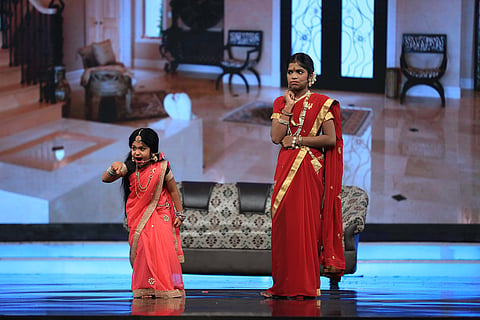

It was the very first episode of Kutti Chutties on Aditya TV in 2013 and the host Imman, a comedian, proclaimed that the show would make history. It did, except, not a pleasant one. Over the next few years, viewers would witness what can only be termed as exploitation of children too young to make decisions for themselves.
The show's participants are between the ages of three and six. It aims to extract laughs from its audience through ignorant statements made by these children. The first episode started off with a child telling the audience that his father regularly beats his mother, even as the watching adults chuckled uncontrollably. The host then asked this boy who his girlfriend is and he pointed at a young woman in the crowd, who looks visibly embarrassed.
The show has since become a huge hit and enjoys enormous following. But isn’t there a line to be drawn when it comes to reality television featuring children?
Recently, Bollywood producer and director Shoojit Sircar who has been part of films like Piku and Pink, reignited the debate when he tweeted that such shows must be banned.
Tamil Nadu has a multitude of competitions for minors, be it comedy shows, dancing, singing or acting. Sun Network, Star Vijay and Zee TV bank on them to garner ratings through the week. These shows claim to be a platform for new talent to be discovered, but are often questioned over the age-appropriateness of the content.
"Kutty Chutties is the perfect case study for this issue," says Dr. Jayanthini, a psychiatrist. "The children talk too much and broach subjects that are not age-appropriate. At every age, there is a certain level of physical, emotional and social growth expected from a child. This cannot be violated constantly."
The Guidelines to Regulate Child Participation in TV Serials, Reality Shows and Advertisements, put out by the National Commission for Protection of Child Rights (NCPCR) has already laid great emphasis on age appropriate content. It clearly states that 'No child should be made to perform or enact scenes or mouth dialogues that are inappropriate for his/her age or those that may cause him/her distress.'
Members of the entertainment industry, however, dismiss the allegation that this format affects a child's emotional growth.
Television star and judge of Zee TV's Junior Super Stars, Archana claims that there is always a filter in place as far as content is concerned. The show features children above the age of five and involves them acting in short plays of various genres.
"In the past, we have explicitly shown displeasure if the content is not appropriate," she says. "Unfortunately, our mindset is as per our convenience. We talk about sex education but have an issue with children acting out a marriage? This is an institution they understand because they see it at home. We must first be clear about what we want to communicate to our children and can't keep passing the buck," she adds.
But Dr. Jayanthini doesn’t buy this line of argument. "These shows have children of varying ages. For smaller children, you start off with the concept of good and bad, then about puberty and it is much later that you even broach marriage. Who explains it and how it is explained is also important. It should be scientific, not sensational," she explains.
The National Commission for Protection of Child Rights says, "The United Nations Convention on the Rights of the Child (Article 32) explicitly indicates that there is a need to recognize the right of the child to be protected from performing or participating in any programme that is harmful to the child’s health or physical, mental, spiritual, moral or social development."
Solvadhellam Unmai host Lakshmy Ramakrishnan, who has herself seen a range of controversies regarding the content on her shows, argues that reality shows for children are a great platform to discover talent.
"Yes, there are grey areas in this format. But what about cell phones then?" she asks. "Children can access pornographic sites, but that doesn't mean you don't buy phones. What you instead do is supervise them and ensure you teach them how to cope with the issue. These shows allow children to show their talent and also teach them to deal with failure and rejection."
But often, reality television goes beyond just discovering talent. Vijay TV's Super Singer Junior for instance, is known for its tear-jerker moments. Be it an ill mother brought to stage, a family reunion under flashing lights, or even discussions on personal problems the contestants face, it has it all.
"Why should personal matters be discussed for the world to see? Children may not understand the consequences immediately and it is not right to put them through that distress on stage," says Dr. Jayanthini. "This is an invasion of their privacy and I would say it amounts to abuse," asserts the psychiatrist.